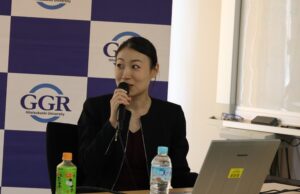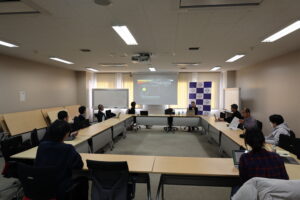On December 20, 2024, the Hitotsubashi University Institute for Global Governance Research (GGR) held the 34th GGR Brown Bag Lunch Seminar titled “Gatekeeping Global Health Partnerships: Civil Society in Multistakeholder Global Governance,” featuring Dr. Mao Suzuki, Assistant Professor at the National University of Singapore.
Dr. Suzuki highlighted the crucial role of Public-Private Partnerships (PPPs) in tackling global health challenges by leveraging resources from international governmental organizations, governments, and private companies. By combining public resources with private sector innovation, PPPs address healthcare inequities, improve access to medicines, and strengthen health systems, particularly in low-income countries. Initiatives like Gavi, the Vaccine Alliance, demonstrate how PPPs can mobilize funding, accelerate innovation, and create sustainable solutions. However, challenges such as power imbalances, accountability issues, and conflicting priorities remain.
According to Dr. Suzuki, PPP success depends on aligning civil society’s welfare goals with businesses’ focus on innovation and profitability, as seen in initiatives like Gavi. However, conflicts arise when civil society advocates for stricter regulations, such as environmental standards or affordable healthcare, which businesses may resist due to cost and flexibility concerns. Dr. Suzuki emphasized that PPPs have significantly impacted non-communicable diseases like malaria and HIV, where shared goals enable collaboration. However, issues like malnutrition and women’s health face barriers due to conflicting interests. Addressing malnutrition often requires stricter food industry oversight, while improving women’s health necessitates affordable care—both challenging corporate profit goals.
During the Q&A session, Dr. Suzuki discussed the difficulty of forming PPPs in countries lacking strong regulatory frameworks. She highlighted the critical role of civil society organizations in bridging gaps through advocacy, treaty enforcement, and public engagement to sustain partnerships.
In conclusion, Dr. Suzuki underscored the potential of PPPs to address pressing health challenges. Their success hinges on aligning civil society and private sector goals, overcoming regulatory conflicts, and building trust. While barriers persist, examples like Gavi show how collaborative efforts can lead to impactful, equitable, and sustainable solutions for global health.
[Event report prepared by] Billal Hossain (Doctoral student, Graduate School of Law, Hitotsubashi University)


